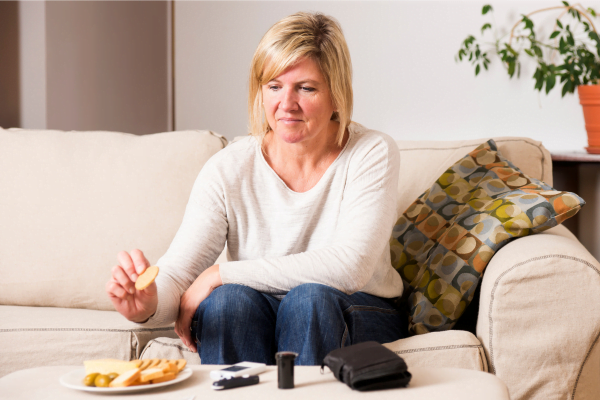If you’re living with diabetes and often find yourself puzzled about which snacks are safe to eat without causing a blood sugar spike, you’re not alone. Snacking with diabetes can be tricky, but armed with the right knowledge, you can enjoy tasty treats while maintaining excellent blood sugar control. This article highlights a range of healthy snack choices perfect for individuals managing diabetes.
Smart Snacking Choices for Diabetes
Choosing the right snacks is crucial for those with diabetes. The best options are low in added sugars, high in fiber, and packed with nutrients. Here are some excellent snack ideas for diabetes patients:
- Fresh Fruit: Berries, apples, and oranges are some of the best snacks for diabetics. These fruits are naturally sweet, full of vitamins, minerals, and fiber, and help curb sweet cravings without causing a spike in blood sugar levels.
- Vegetable Sticks with Hummus: Pair crunchy vegetables like carrots, cucumbers, and bell peppers with hummus for a satisfying snack. Hummus gives you protein and healthy fats, while vegetables offer fiber and essential nutrients.
- Nuts and Seeds: A small portion of nuts or seeds such as almonds, walnuts, or pumpkin seeds offers a crunchy texture along with heart-healthy fats, protein, and fiber. Remember to watch portion sizes since nuts are calorie-dense.
- Greek Yogurt with Berries: Greek yogurt is a high-protein, low-carb snack option, ideal for diabetics. Add some fresh berries for natural sweetness and extra fiber.
- Whole Grain Crackers with Cheese: Choose whole grain crackers with low-fat cheese for a balanced snack. The combination of complex carbohydrates and protein can help stabilize blood sugar levels.
- Hard-Boiled Eggs: Eggs are packed with protein, vitamins, and minerals. Hard-boiled eggs are a convenient and portable snack that can help you feel full and satisfied.
- Edamame: These young soybeans are tasty and rich in protein, fiber, and antioxidants. Enjoy them steamed or roasted for a nutritious snack.
- Sugar-Free Granola Bars: Many traditional granola bars are high in added sugars, but there are sugar-free options available that are suitable for diabetics. Look for bars sweetened with natural alternatives like stevia or monk fruit.
Tips for Snacking Wisely with Diabetes
Along with choosing healthy snacks, here are some tips to help you manage your diabetes effectively:
- Watch Portion Sizes: Even healthy snacks can affect blood sugar levels if eaten in large quantities. Be mindful of portion sizes and aim for balanced servings.
- Read Nutrition Labels: When picking packaged snacks, always read the nutrition labels to check the sugar content, carbohydrate count, and serving size. Opt for items low in added sugars and high in fiber.
- Stay Hydrated: Sometimes, hunger pangs are just a sign of dehydration. Keep yourself hydrated by drinking plenty of water, herbal teas, or fruit- and herb-infused water throughout the day.
- Plan Your Snacks: Planning your snacks in advance can help you make healthier choices and avoid impulsive eating. Keep nutritious options easily accessible at home, at work, and while traveling.
- Be Mindful of Timing: Snacking between meals can help prevent extreme hunger and stabilize blood sugar levels, but it’s important to space out your snacks appropriately and avoid excessive grazing.
By incorporating these healthy snack options and following these tips, you can manage your diabetes while still enjoying delicious and satisfying treats. Focus on whole, nutrient-dense foods, and pay attention to your body’s hunger and fullness signals. With thoughtful choices and mindful eating, snacking with diabetes can be both enjoyable and beneficial for your overall health.
Frequently Asked Questions (FAQs)
Are Granola Bars Good for Diabetics?
Granola bars can be a convenient snack option, but their suitability for diabetics depends on their ingredients and nutritional content. Traditional granola bars often contain high amounts of added sugars and refined carbohydrates, which can cause blood sugar spikes. Healthier alternatives, such as sugar-free or low-sugar granola bars made with whole grains, nuts, seeds, and dried fruits, are available. It’s crucial for diabetics to read nutrition labels carefully and select granola bars high in fiber, protein, and healthy fats while being low in added sugars.
What’s a Good Snack for Diabetics?
For those managing diabetes, snacks that offer both nutritional benefits and stability in blood sugar levels are paramount. Ideal choices include fresh fruits, vegetables, nuts, seeds, Greek yogurt, cottage cheese, hummus with whole grain crackers or veggie sticks, and hard-boiled eggs. These options are rich in fiber, protein, vitamins, and minerals, providing balanced snacks that are low in added sugars and high in healthy fats. By incorporating these snacks into their diet, individuals with diabetes can enjoy sustained energy, feelings of fullness, and better control of blood sugar levels.
Should Diabetics Snack Between Meals?
Snacking between meals can be beneficial for diabetics, especially if it helps stave off extreme hunger and overeating at main meals. However, it’s vital to choose healthy snacks that won’t cause rapid blood sugar spikes. Opt for snacks rich in fiber, protein, and healthy fats to help maintain stable blood sugar levels throughout the day. Additionally, paying attention to portion sizes and timing is crucial when incorporating snacks into a diabetes-friendly meal plan.
What Are Healthy Snacks to Raise Blood Sugar?
For individuals with diabetes experiencing low blood sugar (hypoglycemia), selecting healthy snacks that quickly raise blood sugar levels is important. Options include fast-acting carbohydrates paired with protein or healthy fats, such as a piece of fruit with a handful of nuts, a small serving of whole grain crackers with cheese, or a tablespoon of honey or fruit juice with a few whole grain pretzels. These snacks can help boost blood sugar levels quickly while providing sustained energy to prevent subsequent drops. Always monitor blood sugar levels closely and seek personalized guidance from a healthcare professional for managing hypoglycemia.
